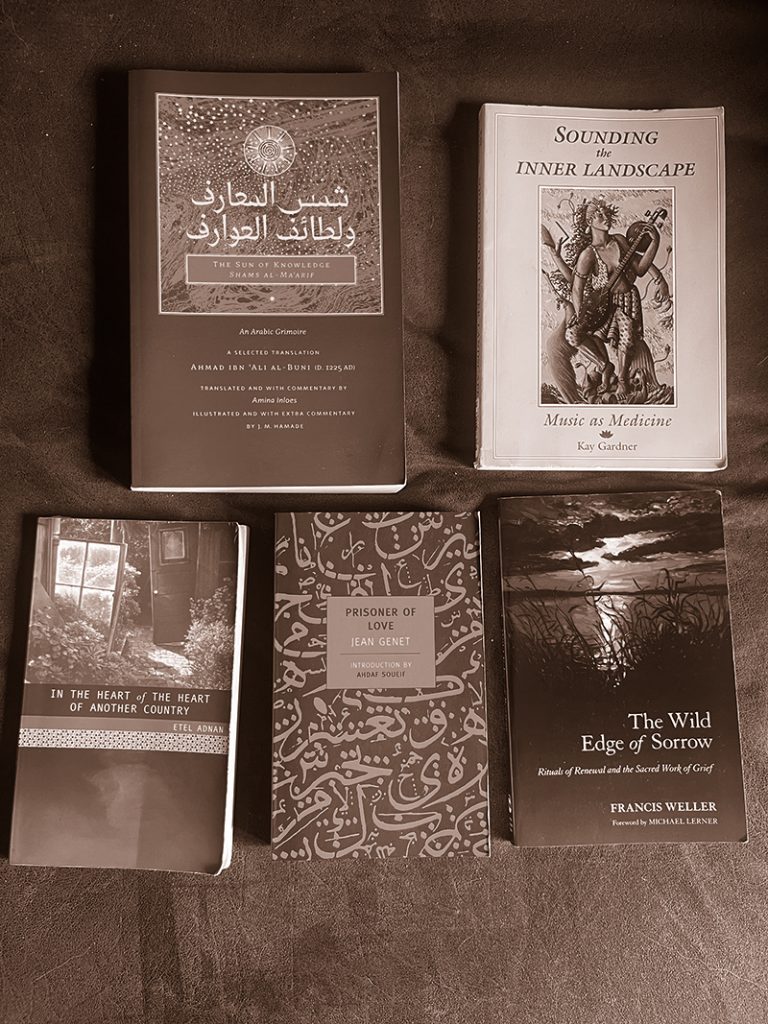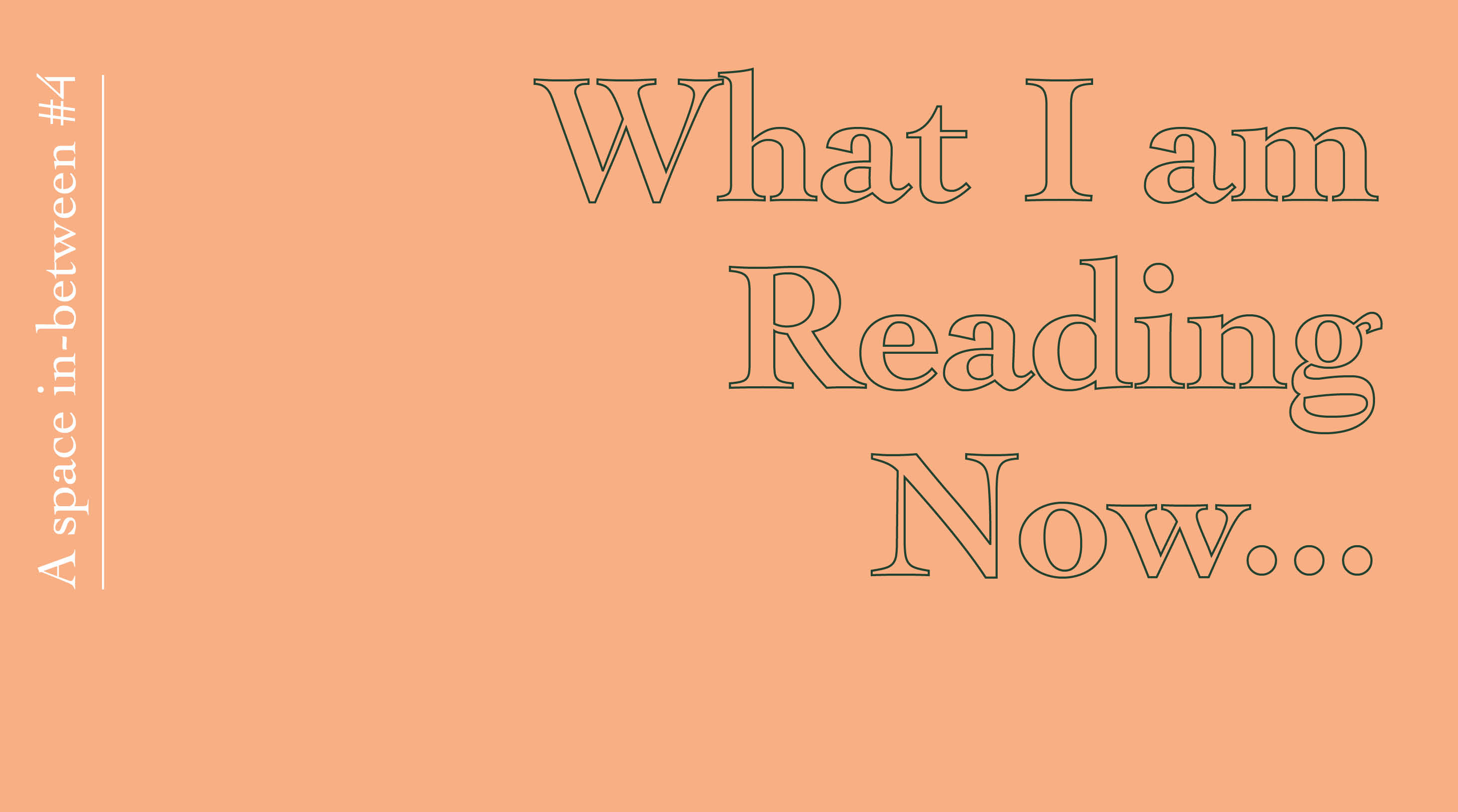What I am Reading Now…
Amal Khalaf
September 2025
These books have held me through months of moving across continents, piecing together new ways of being and working while witnessing the unravelling of so many structures, the collapse of systems I once relied upon, and the rupture of the last illusions of a just world order. They have been companions – comforting, challenging, and grounding me. In their pages are echoes, some centuries old, mirrors of thought and feeling, guides to knowledge and magic, oscillating between ecstasy and the unbearable, offering ways to inhabit a world at war.
The Sun of Knowledge or Al Shams Al Ma’arif sits like a quiet talisman. This grimoire written in the 13th century by Sufi mystic Ahmad Ibn Al Buni is filled with symbols, letters and stars that illuminate, protect and teach. Its words vibrate with a luminous care, showing knowledge not as acquisition but as something held, reflected, performed. When the world feels darkened by cruelty, its pages hum with light, whispering that there is a path through attention, through care, through being present.
In the final chapter of In the Heart of the Heart of Another Country, Etel Adnan writes ‘To be in a Time of War’ in 2005, but it reads as if she had composed it for these days, for this unending witnessing of devastation broadcast into our phones, our feeds. Her lament of infinitives disrupts the dishonest discourse of war, mapping everyday life against the horrors elsewhere:
To have lunch. To ask for some beer. To give one’s order. To drink,
eat, and pay. To leave. To reach home. To find the key. To enter.
To wait. To think about the war. To glance at the watch. To put on the news. To listen to the poison distilled by the military correspondents.
To get a headache. To eat dry biscuits. To put the radio back on. To hear bombs falling on Baghdad. To listen to ambulances.
Adnan’s words as ever are tender and relentless, ordinary and extraordinary. It is an ethical attention, a guide for how to witness without turning away – this remains for me one of the greatest anti-war poems.
Page upon page overflowing with love, agitation, tender rumination and a dedication to the Palestinian cause, defiantly resisting the trappings of identity and language, Prisoner of Love by Jean Genet opens a window of hope in the darkest moments. A “mirror-memoir”, a nomadic, meandering reflection from the 1970s, written in the charged air of hope and revolutionary fire when he was living in the Palestinian refugee camps inspired by the lives of the Fedayeen; it is a reminder that witnessing is intertwined with love, action, and imagination.
Offering a song for the grieving, a ritual for inhabiting loss without collapsing into it On the Wild Edge of Sorrow by Francis Weller is a book introduced to me by my former colleague and friend Lizzie Graham. Weller teaches that sorrow can be held, that lament is a bridge between despair and transformation, between the unbearable and the ecstatic. To read it is to allow grief to move through the body, to feel it as a shared and sacred human inheritance, a space in which care and witness meet.
Sounding the Inner Landscape by Kay Gardner extends this practice into vibration and resonance. Listening, she shows, is not passive; it is embodied, it is political, spiritual, and ecological. The voice, the body, the ear—they are instruments of attention, of prophecy, of response. Reading Gardner reminds of practices I learnt from the sound art collective Ultra-red from many years working with them as they were developing a lexicon of analytical concepts that sought to rethink a pedagogy of the ear, as well as from Ain Bailey and others who integrated Pauline Oliveros’s listening practices into the many workshops we used to hold together. I am reminded to attune, to open my body as a vessel for listening and understanding, a talisman of action as much as reflection.
Companions and guides in the chaos, these texts map a constellation of witnessing, of ethical attention, of loving and listening in the time of war. They guide me through landscapes of grief and care, through violence, across oceans of displacement, and into the heart of thought and knowledge. They remind me that attention, and care are ways to act upon time and place, to regain access to the future, to orient toward the “where” from which hope emerges. My talismans for a world unquiet, in their pages, I find the courage to witness, to listen, to inhabit sorrow, and to act, and remember that even in the darkest, most fractured moments, there are ways to remain awake, alive, and attuned.
Amal Khalaf is a curator and artist and is the curator of Ghost 2568 (October – November 2025) in Bangkok, Thailand and co-Artistic Director of Busan Biennale, South Korea (August – November 2026). She is the outgoing Director of Programmes at Cubitt, London (2019–2025) and has recently co-curated Sharjah Biennial 16 (February–June 2025), in the UAE. She served as the Civic Curator at the Serpentine Galleries (2009–2023), where she shaped the Civic programme and commissioned over 50 long term, collaborative projects in neighbourhoods across London. There, and in other contexts, she has developed residencies, exhibitions and collaborative research projects at the intersection of arts and social justice. Projects include the Edgware Road Project and Centre for Possible Studies (2009-2013), Support Structures for Support Structures (2021), Radio Ballads (2019–2022) and Sensing the Planet (2021). She curated the Bahrain Pavilion for the 58th Venice Biennale (2019) and co-directed the Global Art Forum at Art Dubai (2016). She is a trustee of Mophradat, Athens, and not/nowhere, London, and a founding member of the GCC art collective. She has authored several published essays and recently has co-edited publications including: Vertical Atlas (ArtEZ, 2022), How We Hold (Serpentine/Koenig, 2023) and Radio Ballads: Songs for Change (K Verlag, 2025). Her work, exhibitions and research have also been presented at MoMA PS1, New York, the Sharjah Art Foundation, the Whitney Biennial, New York, Serralves, Porto, Musée d’Art Moderne de la Ville de Paris, Grand Palais, Paris, Berlin Biennale, the Fridericianum, Kassel, the New Museum, New York, MUDAM, Luxembourg, Kunsthall Charlottenberg, Denmark, Het Nieuwe Instituut, Rotterdam and the UCCA Centre for Contemporary Art, Beijing amongst others.
Reading

Please note the views published in What I am Reading Now… are personal reflections of the contributors.
These may not necessarily represent the views of the University of Dundee.
Readers who wish to make a donation to support Medical Aid for Palestinians can do so here.
———
Previous Issue: Karen Tam 譚嘉文, August 2025
Next Issue: Omar Kholeif, October 2025
